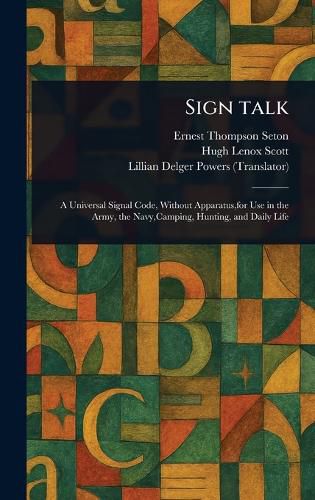Readings Newsletter
Become a Readings Member to make your shopping experience even easier.
Sign in or sign up for free!
You’re not far away from qualifying for FREE standard shipping within Australia
You’ve qualified for FREE standard shipping within Australia
The cart is loading…






This title is printed to order. This book may have been self-published. If so, we cannot guarantee the quality of the content. In the main most books will have gone through the editing process however some may not. We therefore suggest that you be aware of this before ordering this book. If in doubt check either the author or publisher’s details as we are unable to accept any returns unless they are faulty. Please contact us if you have any questions.
"Sign Talk: A Universal Signal Code" by Ernest Thompson Seaton offers a fascinating glimpse into the rich history of communication through hand gestures. This meticulously prepared print republication explores Indian sign language, a universal signal code used by Native Americans for intertribal communication. Discover how this elegant system of hand signals transcends spoken language, providing a practical and versatile means of conveying messages in diverse settings.
Seaton details the intricacies of this non-verbal communication, making it accessible to anyone interested in alternative languages and historical methods of conveying meaning. Explore its applications not only for Native American cultures but also for army, navy, camping, hunting, and everyday life. "Sign Talk" provides a valuable resource for understanding the history of linguistics and the ingenuity of indigenous communication systems. Learn the basics of this timeless method and appreciate the depth of expression possible through simple hand gestures.
This work has been selected by scholars as being culturally important, and is part of the knowledge base of civilization as we know it.
This work is in the public domain in the United States of America, and possibly other nations. Within the United States, you may freely copy and distribute this work, as no entity (individual or corporate) has a copyright on the body of the work.
Scholars believe, and we concur, that this work is important enough to be preserved, reproduced, and made generally available to the public. We appreciate your support of the preservation process, and thank you for being an important part of keeping this knowledge alive and relevant.
$9.00 standard shipping within Australia
FREE standard shipping within Australia for orders over $100.00
Express & International shipping calculated at checkout
Stock availability can be subject to change without notice. We recommend calling the shop or contacting our online team to check availability of low stock items. Please see our Shopping Online page for more details.
This title is printed to order. This book may have been self-published. If so, we cannot guarantee the quality of the content. In the main most books will have gone through the editing process however some may not. We therefore suggest that you be aware of this before ordering this book. If in doubt check either the author or publisher’s details as we are unable to accept any returns unless they are faulty. Please contact us if you have any questions.
"Sign Talk: A Universal Signal Code" by Ernest Thompson Seaton offers a fascinating glimpse into the rich history of communication through hand gestures. This meticulously prepared print republication explores Indian sign language, a universal signal code used by Native Americans for intertribal communication. Discover how this elegant system of hand signals transcends spoken language, providing a practical and versatile means of conveying messages in diverse settings.
Seaton details the intricacies of this non-verbal communication, making it accessible to anyone interested in alternative languages and historical methods of conveying meaning. Explore its applications not only for Native American cultures but also for army, navy, camping, hunting, and everyday life. "Sign Talk" provides a valuable resource for understanding the history of linguistics and the ingenuity of indigenous communication systems. Learn the basics of this timeless method and appreciate the depth of expression possible through simple hand gestures.
This work has been selected by scholars as being culturally important, and is part of the knowledge base of civilization as we know it.
This work is in the public domain in the United States of America, and possibly other nations. Within the United States, you may freely copy and distribute this work, as no entity (individual or corporate) has a copyright on the body of the work.
Scholars believe, and we concur, that this work is important enough to be preserved, reproduced, and made generally available to the public. We appreciate your support of the preservation process, and thank you for being an important part of keeping this knowledge alive and relevant.